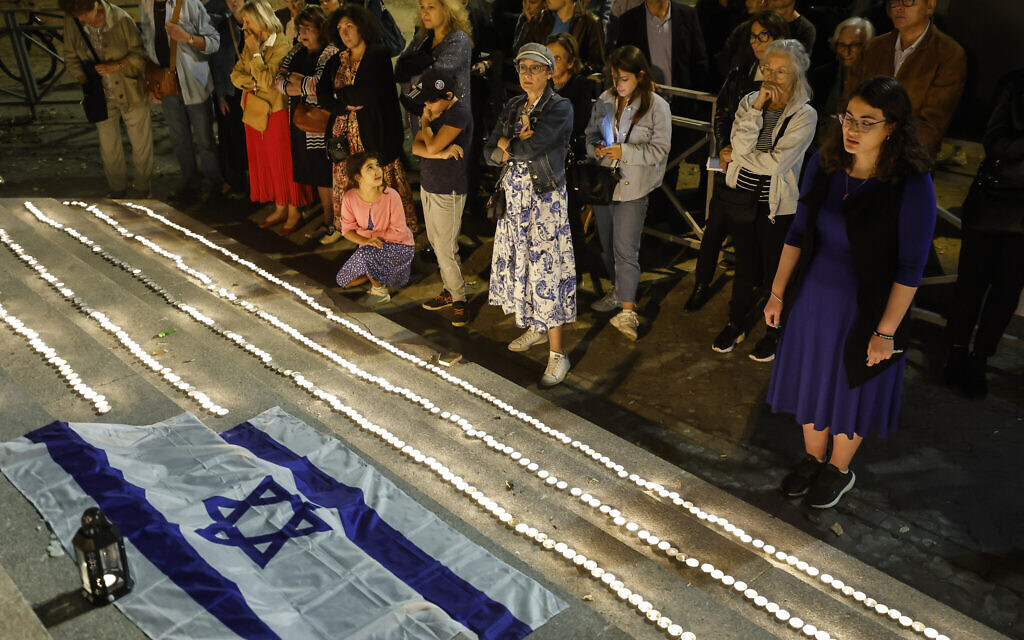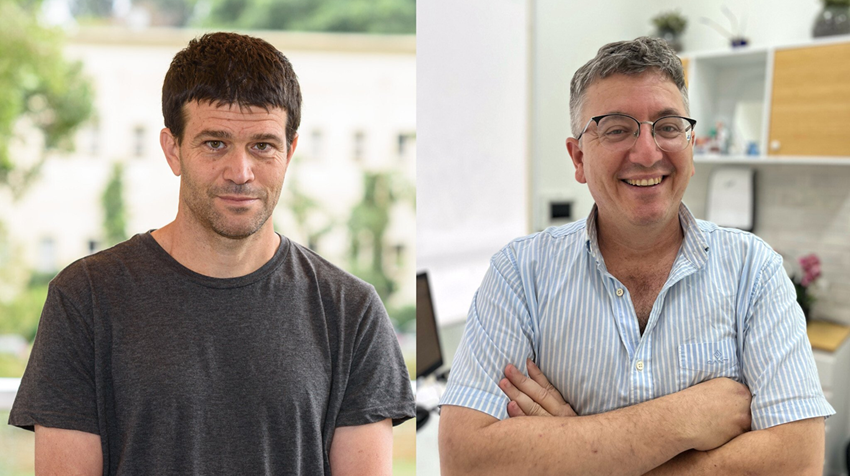Members of the Jewish community light candles outside the synagogue in Strasbourg, France, October 11, 2023, four days after Hamas terrorists launched an unprecedented, multi-front massacre on Israel which killed over 1,200 people. (AP Photo/Jean-Francois Badias)
PARIS — Freddo Pachter says that in his 17 years coordinating the immigration of French speakers to Israel for the Aliyah and Integration Ministry, he has never seen such high demand — and that includes after events such as the Hyper Cacher supermarket terror attack, the jihadist murders by Mohammed Merah, and the 2006 Second Lebanon War.
The number of requests he is receiving from French Jews has continued to rise since October 7, reflecting the climate of fear, he says.
“Some people tell me that they are afraid of being in France because they are Jewish, and they took down their mezuzahs,” Pachter says, referring to the parchment scrolls affixed to the doorposts of many Jewish homes. “It’s unbearable to live like that, to hide any sign of Judaism when no one is ashamed to say that they are Christian or Muslim.”
On October 7, thousands of Hamas-led terrorists stormed the border with Israel under the cover of heavy rocket fire, brutally murdering 1,200 people, mostly civilians, and abducting 240 more to the Gaza Strip, where 132 are still being held — not all of them alive. In the wake of the massacre, Israel launched an ongoing military campaign aimed at retrieving the hostages and ousting Hamas from power in the Strip.
The onslaught also set off a violent wave of anti-Israel activity around the globe, with Jews spanning the Diaspora reporting an alarming rise in antisemitic hate crimes often accompanied by anti-Israel messages.
In December, several events were organized in France aimed at providing information and advice for those who wish to relocate to Israel. Gatherings in Paris, Marseille and Lyon each drew hundreds of attendees, some of whom had to travel to get there.
Freddo Pachter at a gathering facilitating immigration to Israel in this undated photo. (Courtesy)
Beyond the increase in demand, Pachter also observed a change in the profile of the people he met during these meetings.
“Usually we see people who are experiencing professional or social difficulty, who have been fired or want to change fields. But this time we had engineers, doctors and lawyers,” says Freddo, who believes this can be attributed to the increase in antisemitic hate crimes in France. “These are no longer people who leave France for financial problems — their lives in France would be more comfortable.”
Pachter’s observation is more than just a hunch — the Aliyah and Integration Ministry has recorded a 430 percent increase in the number of applications from France since the October 7 onslaught. A number of French Jews confirmed to The Times of Israel that they no longer feel safe in France and feel compelled to hide their kippah or other outward signs of Judaism for fear of being targeted.
“I can no longer see myself living in France with everything that is happening. I am afraid every day for my children, it is no longer a life,” says one mother who lives in Paris and requested to remain anonymous for her own safety.
“October 7 changed everything. I would never have imagined thinking of leaving France for Israel. It may seem paradoxical given the situation in Israel, but at least there we will not have to hide,” says another anonymous French Jewish woman who is seriously considering leaving France in the coming months.
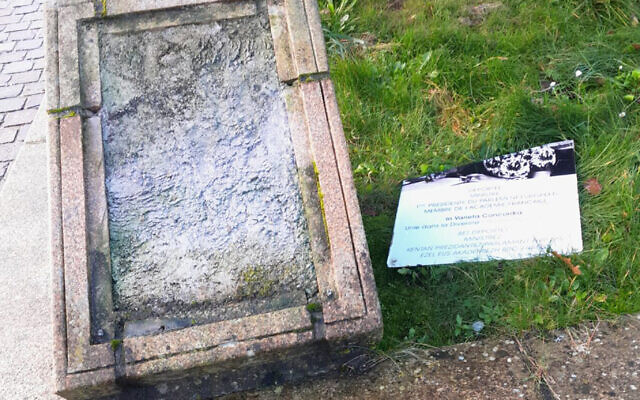
This photo handout on November 21, 2023, by the municipal police of Lesneven, northwestern France, shows a broken piece from a memorial stele in honor of late French politician and Holocaust survivor Simone Veil, after it was desecrated. (Stringer/Lesneven Police/AFP)
The Representative Council of French Jewish Institutions (CRIF) is also listening to such concerns from the French Jewish community, as it has in the past when events locally or in Israel precipitated an increase in antisemitic activity.
“The figures for [immigration to Israel] and the opening of files have always been a barometer of the level of concern of Jews in French society regarding antisemitism,” said CRIF president Yonathan Arfi.
Even if he believes that measures are being put in place to fight this climate of fear, Arfi believes it is now a much deeper problem in French society.
“Political authorities are very aware of the current reality but this is not enough, it’s now more social… We will only really fight antisemitism if it’s socially condemned in all walks of life in French society, which is not always the case today,” he says.
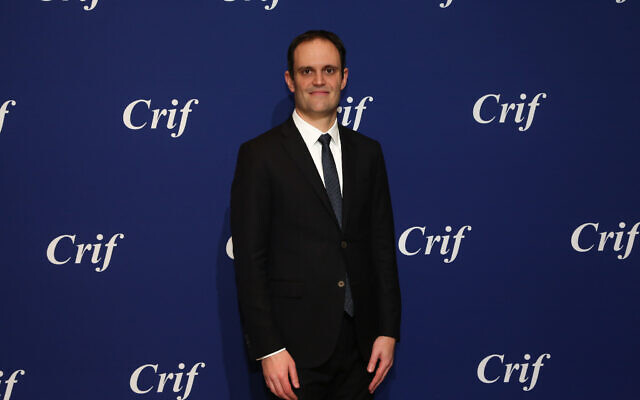
Representative Council of French Jewish Institutions (CRIF) Yonathan Arfi. (Courtesy)
More than 1,500 antisemitic incidents have been recorded in France between October 7 and mid-November, according to the latest statistics from the French Interior Ministry.
“These are mainly tags and insults, but there are also assaults and injuries,” says French Interior Minister Gérald Darmanin.
This is more than three times higher than the 436 antisemitic incidents recorded over the entire 2022 in France.
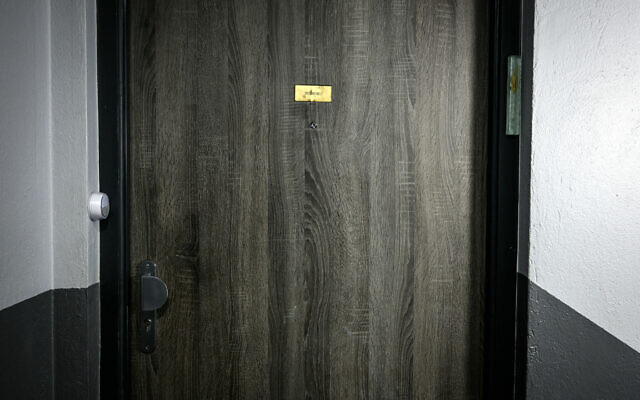
This November 5, 2023, photo shows a swastika carved into the door of the apartment, which bears a mezuzah, where a Jewish woman was stabbed the day before in the French city of Lyon. (Jeff Pachoud AFP)
“These acts are not new, but are much more intense,” says sociologist Michel Wieviorka.
The Hamas massacre is partly responsible, but global views on Jews have also changed, believes the sociologist.
“The Holocaust is no longer what it was [in the minds of the French people]. When the French [came to terms with the extent of the genocide] in the ’70s and ’80s… there was a lot of goodwill for the Jewish world at that time, but we are no longer there. Memory has given way to history. The younger generation no longer knows witnesses or survivors, and all this makes antisemitism easier in its expression,” says Wieviorka, who has conducted extensive research on the topic.
The antisemitic incidents of today must also be viewed in the context of other political discourse and prejudice prevalent in France, he says.
“This kind of expression is no longer coming only from the extreme right, but also by the far left — and while it’s doubtful that it’s always antisemitic, anyone sensitive can feel that it’s never far away in certain discourse,” warns Wieviorka.
When antisemitic incidents and hate speech increase rapidly and in parallel, says Wieviorka, there is a risk that antisemitism can permeate the political and government levels.
“France is not there yet, but we must remain very vigilant,” Wieviorka says.
Source: The Times of Israel































